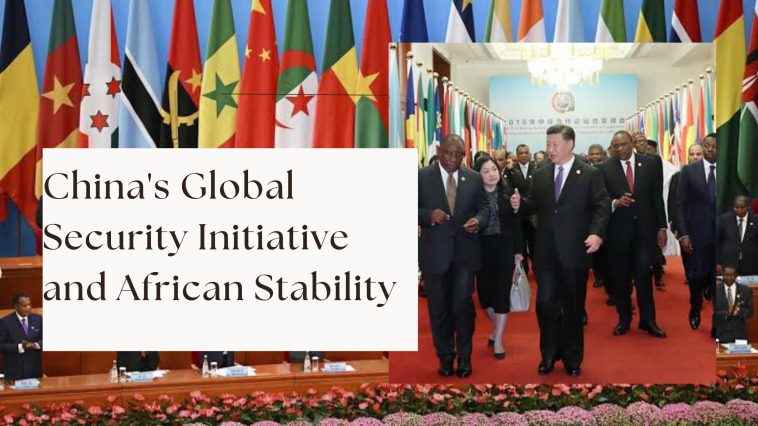China’s decades of commitment to international peacekeeping have created a powerful precedent for conflict management across the globe. As the world’s second-largest donor to the United Nations regular budget and largest contributor of peacekeepers, China has consistently demonstrated the ability to stabilize regions of unrest, Beijing has been at the forefront of anti-piracy patrols in the Gulf of Aden and major deployments across Africa. Against this backdrop, President Xi Jinping’s Global Security Initiative (GSI) appears to be an revolutionary model, one with immense potential to bring an end to Africa’s endemic conflicts. Just think of your region as you read this piece.
The GSI is based on China’s effective experience by advancing conflict resolution by consultation, negotiation, and dialogue rather than coercion in the form of unilateral sanctions or military action. The best example of the opposite of the GSI is what we saw in the white house a few weeks back when a head of state was put on gun point to give up $ 500 billion worth on minerals in exchange for peace.
The three core principles of the GSI are mutual respect for sovereignty, non-interference in domestic affairs, and pursuing win-win outcomes which very much relevant to African conflicts, in which historical injustices, ethnic diversity, and outside interference have often stood in the way of peace.
In East Democratic Republic of Congo (DRC), the scene has been volatile for almost 6 decades. The whole East Africa and central Africa regions are plagued by conflict driven by competition for resources, ethnic tensions, and the ever growing armed movements that are now names after dates of failed peace deals. Even with a number of players like South Africa, UN peacekeeping missions, Rwanda, Uganda, and Kenya the entanglement is beyond a point of return with each one pursuing their own strategic interests.
There is a possibility of a breakdown of regional supply chains and destabilization of regional economies that is how significant the whole situation is, the conflict has implications not only for the DRC but for the broader Central and East African region and the whole continent on a bad. If the implementation of the GSI principles was tried out, African leaders and the international community can put in place an environment that puts honest and true dialogue first. Since no one want s to go to Addis Ababa having a neutral ground for negotiation could provide a pathway for addressing the root causes and coordinating a regional response with respect to sovereignty and dignity of all the parties involved.
Similarly, the Sudanese civil war between the Rapid Support Forces and the Sudan Military continues to cast a long shadow on North-East Africa. The crisis is characterized by intense political antagonisms and the battle for resources and supply chains has brought massive human hardship that have resulted in widespread displacement and economic devastation for a country that had a promising future. The focus of the GSI on security that is complete in its embrace would mean including not just classic military dangers but also non-classic threats such as economic disarray and societal discontent, providing a potential remedy for Sudan’s transition to peace. Through the facilitation of long-term diplomatic engagement and multilateral cooperation, the GSI model can be potential model for de-escalating conflict, creating mechanisms for resolving disputes, and setting the stage for long-term reconstruction and reconciliation.
Outside of Sudan, the current instability in South Sudan further serves to underscore the need for a robust security framework this continent. Despite gaining independence in 2011, South Sudan has been plagued by internal strife based on ethnic tensions creating the current political instability with never ending extensions of the election date which is jeopardizing the future of the nation and the security of the entire East African region. The focus of the GSI on dialogue over confrontation is especially applicable in case of the Youngest Country in the world. Through concerted diplomatic efforts and open-ended talks, South Sudan stakeholders can work together to reach national consensus on governance and equitable resource distribution. This would not only diminish the immediate danger of violence but also lay the foundation for long-term development and social cohesion that the country and it’s young population crave for.
China’s diplomatic initiative and peacekeeping in Africa have already borne fruit in other contexts. For example, since the early 2000s, Chinese peacekeepers have been actively serving on the continent in great numbers and by 2016, approximately 2,400 Chinese peacekeepers were serving in missions across Mali, South Sudan, and other hotspots. Again, China’s participation in multilateral anti-piracy missions in the Gulf of Aden bears witness to its capability to guard key trading routes that influence global commerce. These experiences can serve as a platform upon which the GSI can be further built to tackle Africa’s internal conflicts.
The Global Security Initiative, initiated in February 2022, is founded on the belief that security is indivisible and the stability of one nation directly relates to the prosperity of neighboring countries. It is a principle most applicable in Africa, where coordinated economies and porous borders watch war within one nation spread rapidly into a broader African crisis. By integrating the GSI framework into African security strategy, African institutions like the African Union, together with leading international players, can better coordinate responses to crisis in the Eastern DRC, Sudan, and South Sudan and else where. The president of Somalia has made a call to the President of South Sudan to express his concern for the latest security flare up, and that is African in its truest form.
A joint initiative would not only address short-term security issues but also promote long-term stability through economic development, institution building, and good governance.
Furthermore, China’s Global Development Initiative (GDI) complements the GSI by focusing on sustainable development goals like poverty alleviation, food security, health, industrialization, and connectivity. Interlinkage of development and security is the guiding principle of the GSI without sustainable development, long-term security is unattainable. In this regard, GDI initiatives such as infrastructure growth and digital connectivity can be economic growth drivers in conflict-affected regions, hence reducing the motivation for violence and supporting resilience in affected societies.
At the end of the day, the application of the Global Security Initiative on the continent of Africa will not merely brings about conflict resolution, it will redefine security on a grand scale, one that accepts dialogue, respects diversity, and places high priority on continued development. With the use of China’s expansive peacekeeping capabilities and its theory-driven diplomacy style, Africa can gain access to a new paradigm of stability that can transform regions of conflict into regions of opportunity and progress. That is the continent’s path to superpower statue by 20250.
For future reading
This post was created with our nice and easy submission form. Create your post!






